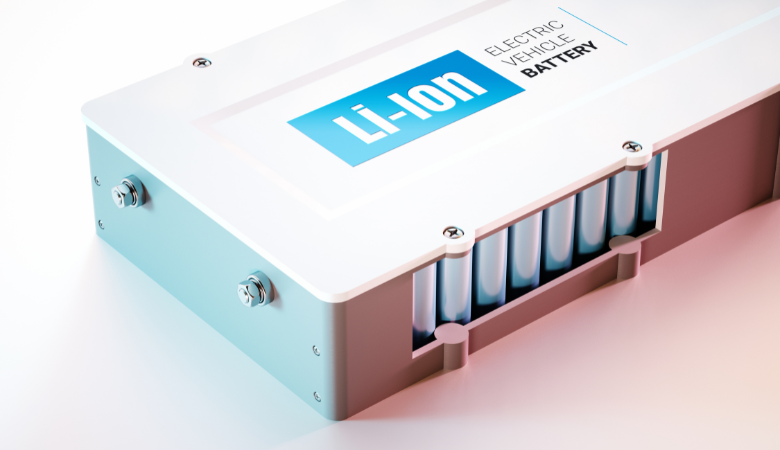Leveraging Smart Storage Technology to Combat Lithium-ion Battery Fires
SBIR awardee ESSPI's smart battery storage system addresses lithium-ion battery transportation safety challenge

THE CHALLENGE
Funding Agency: PHMSA
Small business: Energy Storage Safety Products International, LLC (ESSPI): https://www.esspi.com/
Project: Battery Logistics Integrated Safety System (BLISS)
Principal Investigator: Ronald Butler
Location: Detroit, MI
Lithium-ion batteries are gamechangers for charging and energy storage and essential to a variety of household devices including laptops, bicycles, and cars. For the transportation sector, lithium-ion batteries are central to the rapid growth of electric mobility, making it feasible to travel farther and faster on a single charge.
However, batteries pose severe safety risks when poorly made, damaged, charged improperly, or at the end of useful life. Batteries in such conditions can overheat and undergo a “thermal runaway” event. Batteries in thermal runaway can emit dangerous smoke, catch fire, or even explode, which can damage other batteries and cause a cascading thermal runaway incident. This chain reaction creates a dangerous inferno that can ignite in seconds and engulf transport vehicles or entire homes. A series of fires linked to lithium-ion batteries in New York City led to a record 267 fires and 18 deaths in 2023 alone, according to the New York City Fire Department. Battery fires in homes, streets, and even planes bring lithium-ion battery fires to national attention.
THE TECHNOLOGY
The rapid demand for lithium-ion batteries calls for new battery safety solutions. Energy Safety Storage Products International (ESSPI), a small business that focuses on lithium-ion battery storage, is developing a smart battery transportation packaging system called Battery Logistics Integrated Safety System (BLISS). The technology uses sensors to give advanced warning for battery failures before they happen and protection from the incident once batteries fail. This work is funded by the Pipeline and Hazardous Materials Administration (PHMSA) through the U.S. DOT’s Small Business Innovation research (SBIR) program.
ESSPI’s SBIR Phase I and Phase II awards have resulted in the BLISS prototype, which is designed to withstand and contain battery fires preventing spread between cells. To do this, ESSPI has been conducting research to understand the environment before and during battery failure and testing different materials that can withstand heat and flame. The initial phase of material testing focused on the interior. In Phase II, ESSPI developed different form factors of BLISS to meet different needs, such as a blanket for EV’s, a charging locker for e-mobility, and caps for 55-gallon drums used to transport damaged/end-of-life batteries.
Simultaneously, ESSPI continued to refine their intelligent detection, notification, operations, and communication (DNOC) system that will autonomously monitor for system failure. The DNOC system enables real-time updates. This is possible through heat detection mechanisms and utilizing sensors that monitor the internal environment for gases that indicate battery failure at the earliest possible stage. In the event of battery failure, the device immediately notifies relevant parties like first responders, motor carriers, and drivers.
SBIR’S ROLE
Since receiving SBIR funding, Ronald Butler, the CEO of ESSPI, says the company has grown its staff by more than 50%. This has allowed ESSPI to continue material testing, align BLISS design with real-world target batteries, and study the environment before and during failure. “As ESSPI's founder and CEO, I can speak to the immense benefits of the SBIR program. There is no doubt on our part that without the support of PHMSA, we would never have been able to reach our current goals,” said Butler. ESSPI also identified potential technologies to serve as components of its detection, notification, control and communication package, a key goal in their pursuit of making BLISS commercially viable. Butler also noted that the SBIR contracting officers are experienced working with small businesses without extensive prior experience and are “understanding that we [are] a small company with big ideas.”
THE FUTURE
ESSPI is rapidly approaching commercialization for the initial suite of products, including a BLISS prototype targeting deployment in the automotive space. While preparing for commercial expansion, they secured multiple patents for their packaging and monitoring technology.
Butler noted that through client and partner interviews, they identified the immense benefits their prototype will have on the progress of green technologies in transportation. According to Butler, “If we can leverage our solutions to prevent and mitigate catastrophic battery failures, we create a "safe space for [the industry and consumer], thereby increasing sales and speeding adoption of really sound green solutions.”
